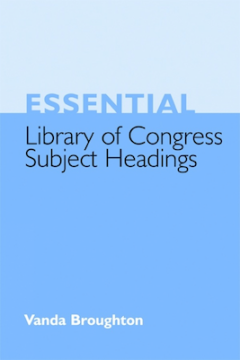
Additional Information
Book Details
Abstract
Library of Congress Subject Headings (LCSH) are increasingly seen as 'the' English language controlled vocabulary, despite their lack of a theoretical foundation, and their evident US bias. In mapping exercises between national subject heading lists, and in exercises in digital resource organization and management, LCSH are often chosen because of the lack of any other widely accepted English language standard for subject cataloguing. It is therefore important that the basic nature of LCSH, their advantages, and their limitations, are well understood both by LIS practitioners and those in the wider information community.
Information professionals who attended library school before 1995 - and many more recent library school graduates - are unlikely to have had a formal introduction to LCSH. Paraprofessionals who undertake cataloguing are similarly unlikely to have enjoyed an induction to the broad principles of LCSH. This is the first compact guide to LCSH written from a UK viewpoint.
Key topics include:
- background and history of LCSH
- subject heading lists
- structure and display in LCSH
- form of entry
- application of LCSH
- document analysis
- main headings
- topical, geographical and free-floating sub-divisions
- building compound headings
- name headings
- headings for literature, art, music, history and law
- LCSH in the online environment.
Library of Congress Subject Headings (LCSH) are increasingly seen as 'the' English language controlled vocabulary, despite their lack of a theoretical foundation, and their evident US bias. In mapping exercises between national subject heading lists, and in exercises in digital resource organization and management, LCSH are often chosen because of the lack of any other widely accepted English language standard for subject cataloguing. It is therefore important that the basic nature of LCSH, their advantages, and their limitations, are well understood both by LIS practitioners and those in the wider information community. Information professionals who attended library school before 1995 - and many more recent library school graduates - are unlikely to have had a formal introduction to Library of Congress Subject Headings (LCSH). Paraprofessionals who undertake cataloguing are similarly unlikely to have enjoyed an induction to the broad principles of LCSH. This is the first compact guide to LCSH written from a UK viewpoint. Key topics include: • background and history of LCSH • subject heading lists • structure and display in LCSH • form of entry • application of LCSH • document analysis • main headings • topical, geographical and free-floating sub-divisions • building compound headings • name headings • headings for literature, art, music, history and law • LCSH in the online environment. Readership: There is a strong emphasis throughout on worked examples and practical exercises in the application of the scheme, and a full glossary of terms is supplied. No prior knowledge or experience of subject cataloguing is assumed. This is an indispensable guide to LCSH for practitioners and students alike.
"I would recommend this book to both new cataloguers and lone librarians who find themselves cataloguing with no formal training. I would also recommend it to anyone who feels that they could do with a fresh and fun reminder of the basics of subject headings."
CILIP Cataloguing and Indexing Group Newsletter
Vanda Broughton MA DipLib is Programme Director for the Diploma/MA in Library and Information Studies at the School of Library, Archive and Information Studies, University College London. She has taught, written and led training courses on classification for many years. She is joint editor of the new edition of the Bliss Bibliographic Classification scheme, is a member of the UDC revision working group, and also of the UK Classification Research Group.
